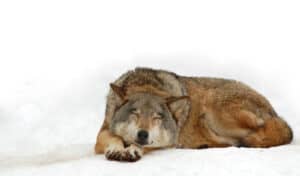
Do you find yourself becoming more awake and alert as the day—and night—go on? You might be a wolf! Making up approximately 15% of the population, wolves are classic night owls. In fact, most wolves don’t start to feel tired until after midnight.
When the rest of the world is winding down for the day, wolves’ energy levels are at their peak. While this works to the wolf’s advantage for late afternoon meetings and bedtime routines with their wolfpack, the 9-5 was simply not designed with this chronotype in mind.
But this doesn’t mean wolves aren’t the productive type. Read on to find out how to get the most out of your day and use your unique energy levels to your advantage. Howling optional!
Key Traits: Impulsivity, Pessimism, Creativity, Moodiness
Key Behaviors: Takes Risks, Prioritizes Pleasure, Seeks Novelty, Reacts with Emotional Intensity
Your Best Sleep-Wake Schedule
In the wild, wolves come alive when the sun goes down. We can see this with the wolf chronotype—people who typically struggle to wake up before 9 a.m. and don’t feel tired until midnight or later.
Sleep in (Until 8:15 a.m.)
Take a nap (1 – 2 p.m.)
Go to bed (12 a.m.)
The ideal wake-up time for a wolf is 7:30 a.m. If you sleep in later than that, you’ll struggle to fall asleep at night. Wolves benefit from setting two alarms—one to wake you up and one to let you slowly drift into consciousness. Looking to catch some extra Z’s on the weekends? Sleep in no later than 8:15 to avoid sabotaging your sleep schedule.
Naps are not ideal for wolves whose energy peaks in the afternoon. If you want to fall asleep by midnight, avoid naps in general. If you really need a refresh, opt for early afternoon at the latest.
With a near-midnight bedtime, wolves fall asleep the latest of all chronotypes.
Strategize Your Workday
Wolves are not early risers by design and are typically groggy until around noon. It’s better to start your day by planning and getting organized, saving your difficult tasks or meetings for when you’re at your peak later in the day. Have a job interview or need to make a good impression at a work lunch? Try to schedule for 12 p.m., when you’ll be alert, impressive, and charming.

Your key productivity times are late morning and late afternoon, which is when you should prioritize important tasks that require problem-solving, creativity, or critical thinking. Your most productive window is between 2 and 4 p.m.
Have a meeting or need to send an important email? Aim for 4-6 p.m. When other chronotype’s energy levels are waning, you’ll be wide-awake, alert, and ready to connect with others to make important decisions.
Brainstorming (Before 11 a.m.)
Busy work (11 a.m. – 1 p.m.)
Job Interviews (12 p.m.)
Work lunches (1 – 2 p.m.)
Creative thinking and problem-solving tasks (2 – 4:15 p.m.)
Important meetings, calls, and emails (4:15 – 6:15 p.m.)
Better Manage Your Relationships
Wolves are well-composed starting in the late afternoon and continuing into the late evening. Often the last to leave a party, wolves are known to be extroverts and the center of attention. Wolves are also comfortable being alone and may appear standoffish to those who don’t know them well.
Spend time with your kids (5 – 7 p.m.)
Have an important conversation with your partner (8 p.m.)
Call family or friends (9 – 11 p.m.)
Have sex (10 a.m. or 10:30 p.m.)
Take advantage of your elevated mood in the late afternoon and evenings and have important conversations with your partner or spend time with your kids. Wolves are the perfect bedtime-orchestration parents and generally aren’t too tired for homework or stories.
Wolves are always on the hunt for new experiences and sensations and tend to seek out new friends and partners more than other chronotypes. Your best time to have sex is generally around 10:30 p.m., after a serotonin-boosting dinner of carbs.
When to Sip, Snack, and Splurge
Wolves typically aren’t hungry in the morning but tend to be ravenous in the afternoon. Hold off on having coffee until 11 a.m., when your cortisol levels drop and you’re ready for that buzz. Avoid any caffeine after 2 p.m. to avoid interfering with your sleep schedule. Your energy levels will spike in the late afternoon and evening to keep you alert and focused past your prime.
Have coffee (11 a.m. – 2 p.m.)
Eat a balanced lunch (1 p.m.)
Snack time (4 p.m.)
Have a drink (7 – 8 p.m.)
Eat a carb-heavy dinner (8 p.m.)
Eat a balanced lunch in the afternoon and delay having dinner until 8 p.m. Wolves are prone to late-night binges and cravings, so having a late dinner will help keep you from snacking in fridge-light. Be sure to eat a carb-heavy dinner, as it will help you wind down for bed.
Always consume alcohol in limitation and be sure to avoid it at least four hours before bed.
Streamline Your Fitness Goals
As an evening type, wolves tend to be more sedentary in general. It’s best for wolves to exercise later in the day, when the body is warmed-up.
Go for a run (6 p.m.)
Play a team sport (6 – 9 p.m.)
Strength train ( 6 – 7 p.m.)
Between 6 and 9 p.m. is when your mood, strength, and coordination are at their highest. Go for a run or play team sport during that time for optimal performance. Yoga is a good pre-dinner activity for wolves, or it also can help you power down later in the evening before bed.
Avoid exercising at least three hours before bed to avoid interfering with your sleep schedule.
The Sleep Doctor Forum: Real Experiences, Real Connections
Continue the discussion on the Sleep Doctor Forum. Connect with experts and fellow forum members on CPAP, sleep apnea, and all things sleep. A priceless resource that’s free to join.
























